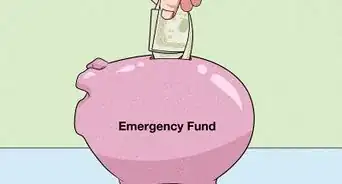This article was co-authored by Lucy Yeh. Lucy Yeh is a Human Resources Director, Recruiter, and Certified Life Coach (CLC) with over 20 years of experience. With a training background with Coaching for Life and Mindfulness-Based Stress Reduction (MBSR) at InsightLA, Lucy has worked with professionals of all levels to improve the quality of their careers, personal/professional relationships, self marketing, and life balance.
There are 15 references cited in this article, which can be found at the bottom of the page.
This article has been viewed 122,824 times.
Starting a new life can be a great opportunity to make refreshing choices and decisions. However, doing so with no money can present a bit of a challenge as well. To make the most of your new life, start by creating a list of goals and keeping a positive mindset. Learn more about saving and your spending habits. Get a job to bring in additional income and reach out to your friends and family for assistance, if needed.
Steps
Deciding How You Want to Live
-
1Be clear on why you are starting over. Spend some time determining whether or not you are creating a new life out of necessity or desire. If this is a choice based out of need, then you’ll want to identify what life improvements you will need to make as well. If you are making a decision based out of want, then carefully consider what your ideal life looks like.
- For example, if you are starting a new life because you need some space from negative family members, then you might include limiting contact with these persons as part of your plans.
- Or, if you are starting a new life because you want a challenge and some excitement, then you might consider placing yourself in an unusual circumstance, such as living in a foreign country.
-
2Make any moving plans, if necessary. You may need to move to a new apartment or house in order to truly start over in the same city. Or, you may need to head out of the country entirely. Do as much research as you can online to determine the best way to use your limited funds. Look for locations where the cost of living is cheap and jobs are plentiful.[1]
- Find locations with affordable living options by selecting cities and then searching online for rent and food expense estimates. For example, in the Cook Islands you can find an apartment to rent for $130 a month.[2]
Advertisement -
3Decide who to keep in contact with. Starting over can mean severing some personal ties, but it doesn’t always require breaking your bonds with your loved ones. Go through a list of all of your friends and family and determine what place they should have in your new life, if any at all. You’ll also want to consider how you will break the news to everyone that you’ve decided to start over, or if you will just stay silent about your choices.
- For example, if you are trying to rebuild your finances and you have a relative who has a tendency to be a bad financial influence, then you will need to determine if you should continue to interact with them moving forward.
-
4Keep a goal journal. Spend at least 15 minutes a day writing and thinking about your current situation and editing your goals. Try to create goals for a month, for one year out, for five years out, and for ten years out. Reassess your goals on a regular basis and change them if you need to.[3] Make sure that your goals closely align with what type of life you’d like to lead in the future.[4]
- For example, you might write, “I would like to have $500 saved by the end of the year.” This will help you to be more financially stable, so it will likely fit with your lifestyle choices, too,
- Make sure to think both big and small when setting your goals. Don’t be afraid to push for a goal that seems a long-shot.[5]
-
5Break down each goal into a series of actionable steps. Consider exactly what actions you’ll need to take for each goal and write them down as a sequence. As you decide to tackle that particular goal, look at this list as a reference. This will make larger goals seem more possible. This, in turn, will make you feel more in control of potentially difficult situations.[6]
- For example, if you plan to save money, then you’ll probably need to start by monitoring your spending or perhaps opening a savings account.
-
6Seek out exciting, new experiences. It can be easy to get bogged down in the unknown or the unusual when you are starting over. Instead, force yourself to use positive adjectives when describing what you are experiencing. Change from using “weird” to “exciting,” for example. If you feel yourself getting too anxious, tell yourself to open your eyes and find one thing positive about your new environment.[7] [8]
- For example, try to seek out the natural beauty of an area. Look for how the birds fly in the sky or how the sunlight comes through the trees. If you are stuck in an office all of the time, you can even print out these images and place them around you.[9]
-
7Give yourself positive encouragement. Starting over takes time and a great deal of work. Don’t expect everything to be in order overnight. Instead, be gentle with yourself and acknowledge all of your victories, even the small ones. Tell yourself throughout the day, “You are doing good.” Give yourself compliments as often as possible.[10]
- It is helpful to see your life as a book. This is just one chapter of many and does not necessarily tell you what the end will be. You are still writing it out.
- You will also need to be watchful when you fail, so that you don’t let these moments set you too far off course. For example, if you make a poor spending choice with your limited funds, see if you can correct it as quickly as possible.[11]
Rebuilding Your Financial Life
-
1List out your debts. Take out a piece of paper or open up a spreadsheet on your computer. Write down all of the details regarding your debts. Include information about required payment amounts, due dates, and interest percentages. Update this list often and mark off the debts as you pay them off.[12]
- This will also allow you to see which debts need to be paid off first and which ones can come later. For example, it is always a good idea to pay off high interest credit card charges as soon as possible.
- One entry on your list might look like, “American Express Card, $1,800 balance, 18% percent interest rate, $25 minimum payment per month.”
-
2Develop a savings plan. Even without any money at present, it is still a good idea to consider what you will do with cash when you have it. Your goal should be to move away from a lifestyle that involves surviving paycheck to paycheck. This could mean finding a job and moving a certain percentage of pay into a savings account each month. This could also mean spending some time learning about saving on a site such as Learnvest.[13]
- There are also some handy spending “tricks” that you can learn, such as setting aside the change from your checking transactions using an app, such as Qapital.[14]
-
3Choose a thrifty lifestyle. Make a decision to pursue frugal, but safe, accommodations. If you are moving, select a location that will allow you to live in a thrifty way. Look into the cost of living numbers and consider the benefits of living within a city versus in a rural area, for example. You can also investigate saving money on transportation by forgoing a car.[15]
- For example, Panama is one location where you can live comfortably for around $300 a month.[16]
-
4Find a job. If do not have a paid position, then look for one by creating a solid resume. It might help for you to list out all of your skills before you begin applying for positions. You could contact a temp agency as well or just browse the job sites on your own. Make sure that you only apply for legitimate work opportunities.[17]
- You might also consider putting your skills to work by creating a business.[18]
-
5Create back-up plans. Without a financial safety net, there are many moments in life that you will need to navigate carefully. You’ll feel less anxious if you create at least one back-up plan for all of the major decisions and actions that you take. Try to think about both worst and best case scenarios.[19]
- For example, if you are saving money by cycling to work and your bicycle breaks down, what will you do? You might want to investigate public transportation as a back-up option.
-
6Talk with a financial advisor. Go online and enter your city and “financial advisor.” Then, contact each advisor and ask if they offer any fee-free assistance. If they do, make an appointment and bring all of your financial paperwork with you to the meeting. They may also ask that you attend a financial support group with some of their other clients.
- You can also find a forum for financial advice online and ask the members for tips on savings and tracking spending.
Getting Help From Others
-
1Take advantage of government programs. Talk to government officials in your area to see if there are any assistance programs available to you. Consider these programs a temporary way to give your finances a boost in order to prepare you for future success. Make sure to follow all guidelines involved with the program.[20]
- For example, there are many government grants available to small business owners. Some of these grants can help you to start over with a new business even if you lack the initial funding. Check with the Small Business Association (SBA) for more details.
-
2Ask your friends and family for help. Tell your friends and relatives about your goals and your plans to start over. See if they have any suggestions or advice. They might also be able to provide you with additional resources, financial or otherwise, to help you get on your feet.[21]
- Be aware that your story and choices may also help others to make positive changes in their own life. For example, you might have a friend who is struggling with credit card debt and could use any information that you learn about paying it down.
- When talking to your friends and family members you might say, “I have very little money to work with, but I’m planning to get a job in an industry that guarantees regular pay and insurance as well.”[22]
-
3Consider staying with friends. Living expenses can very quickly destroy your budget and ability to save. If you have a friend or family member who is willing to let you “couch surf” for a while, you might consider this as a viable option. It will allow you to save up money and give you enough time to find a living situation that suits your frugal lifestyle.[23]
- You may also find that you are not the only person living in someone else’s home, especially in big cities. It is quite common for people to open their home’s to others searching for paid work in crowded, competitive areas.
-
4Make lots of professional contacts. Every time that you talk with someone, try to consider how they could work as a professional contact for you. This may sound mercenary, but considering these connections can also make it possible for you to help them as well. When you are out in public, try to talk with the people that you encounter and be friendly as often as possible.[24]
- For example, if you are a waiter looking for work it never hurts to talk with the wait staff when you eat out at restaurants. They may be able to give you some tips regarding looking for a job in that area.
-
5Talk with a therapist. Go online and enter your city and “therapist” into a search engine. Contact these professionals to see if any of them offer free sessions or group therapy. If so, this can be a great way for you to explore your past choices and how you can make changes for the present. In a support group, you can also find people who can be your friends in your new life.
Community Q&A
-
QuestionWhat if I hate my field and would definitely be required to get a degree I can't afford to get to be hired at the very bottom of the only field I think I might not be miserable in?
 Community AnswerSome public libraries and business organizations offer free courses in many fields, with certificates upon completion. They could be classes that would be included to earn a degree and may become transferable college credit. A certificate could be the beginning to getting your foot in the door. Add to the certificate some volunteer work experience in the field. Submit this on your resume and gain contacts from your free certificate training and volunteer experiences that you might want to use for job references. Talk with your new contacts for tips on how they got started. Present all these at the interview for an entry position in your new field of work.
Community AnswerSome public libraries and business organizations offer free courses in many fields, with certificates upon completion. They could be classes that would be included to earn a degree and may become transferable college credit. A certificate could be the beginning to getting your foot in the door. Add to the certificate some volunteer work experience in the field. Submit this on your resume and gain contacts from your free certificate training and volunteer experiences that you might want to use for job references. Talk with your new contacts for tips on how they got started. Present all these at the interview for an entry position in your new field of work.
References
- ↑ http://tinybuddha.com/blog/6-ways-to-live-a-life-of-passion-and-adventure-right-now/
- ↑ https://brightside.me/article/ten-heavenly-places-where-you-can-easily-start-a-new-life-5255/
- ↑ Lucy Yeh. Career & Life Coach. Expert Interview. 21 November 2019.
- ↑ http://www.keepinspiring.me/how-to-live-life-to-the-fullest/#ixzz4duAGGBVO
- ↑ https://www.pickthebrain.com/blog/broke-doesnt-mean-dead-6-ways-start-new-life/
- ↑ https://www.pickthebrain.com/blog/broke-doesnt-mean-dead-6-ways-start-new-life/
- ↑ Lucy Yeh. Career & Life Coach. Expert Interview. 21 November 2019.
- ↑ http://tinybuddha.com/blog/6-ways-to-live-a-life-of-passion-and-adventure-right-now/
- ↑ http://www.cosmopolitan.com/lifestyle/a39772/why-i-gave-up-a-95k-job-to-move-to-an-island/
- ↑ http://www.purposefairy.com/74960/how-to-start-all-over-and-rebuild-your-life-from-scratch/
- ↑ http://www.keepinspiring.me/how-to-live-life-to-the-fullest/
- ↑ https://withoutboxes.com/archives/start-over/
- ↑ http://financialbestlife.com/how-to-move-with-no-money/
- ↑ http://financialbestlife.com/how-to-move-with-no-money/
- ↑ http://www.oprah.com/money/suze-ormans-10-tips-for-a-fresh-financial-start#ixzz4duDQOd3Y
- ↑ https://brightside.me/article/ten-heavenly-places-where-you-can-easily-start-a-new-life-5255/
- ↑ http://financialbestlife.com/how-to-move-with-no-money/
- ↑ https://www.forbes.com/sites/laurabegleybloom/2016/08/25/how-this-woman-opened-a-jamaica-hotel-with-no-money-and-changed-her-life/#2e5cea874f44
- ↑ https://withoutboxes.com/archives/start-over/
- ↑ https://www.legalzoom.com/articles/affordable-businesses-you-can-start-with-little-or-no-money
- ↑ http://tinybuddha.com/blog/6-ways-to-live-a-life-of-passion-and-adventure-right-now/
- ↑ https://www.pickthebrain.com/blog/broke-doesnt-mean-dead-6-ways-start-new-life/
- ↑ http://financialbestlife.com/how-to-move-with-no-money/
- ↑ http://www.wanderingearl.com/how-much-money-do-you-need-to-start-a-life-of-travel/
- ↑ http://www.aarp.org/personal-growth/transitions/info-06-2011/5-weeks-ep5-purpose.html
About This Article
To start a new life with no money, take steps to improve your financial situation and try to make new connections. Create a resume so you can apply for jobs online, since a regular income will help you manage your expenses. If getting a job isn’t possible just yet, apply for benefit programs in your area so you can get financial aid. Consider asking a friend or family member if you can stay with them so you have more time to sort out your living situation, since this will help free up your limited budget. Whenever you’re out, talk to people around you to make new friends and professional contacts who may be able to help you in your new career. For tips on how to create a budget and a financial backup plan, keep reading!












































































